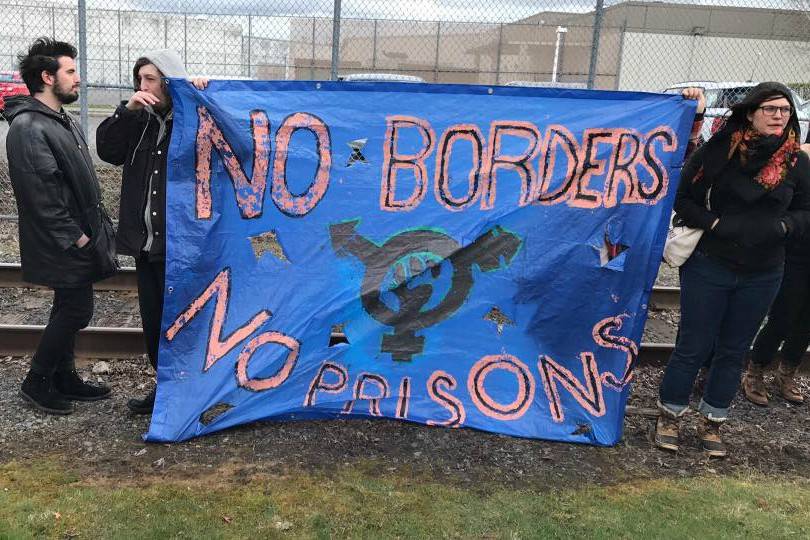Hunger strikes are common at Tacoma’s Northwest Detention Center (NWDC), where immigrant detainees complain that the work wages are just as sparse as their daily meals of rice and beans. Occasionally on the weekends, their food offerings liven up with the appearance of tuna or chips. Family visits are also limited, and mostly relegated to video calls.
Tension between the NWDC guards and detainees reached a boiling point in early February, when over 120 detainees staged a hunger strike over what they considered unfair conditions. According to immigrant rights advocate Maru Mora-Villalpando, nine hunger strikes were staged at NWDC between April and November 2017. The detainees wanted to be fairly remunerated for their work; they say that they’re only paid one dollar for a day’s work of maintaining the center, according to a lawsuit recently filed by the ACLU-WA. The suit alleges that guards physically assaulted a few of the detainees and threw one of them, Jesus Chavez Flores, in isolation for 20 days. An alleged blow to one of Chavez’s eyes during the confrontation has blurred his vision, and may have caused permanent damage.
“I participated in the hunger strike because I’ve seen the injustices that people here in detention have faced. And for taking peaceful action to protest injustice, I have been hit, injured and unfairly punished,” Chavez said in a statement.
On February 23, the ACLU-WA filed a lawsuit to protect Chavez’s free speech rights. The suit contends that Chavez was retaliated against for expressing his right to protest unfair conditions. Chavez was released from solitary confinement Thursday, according to his attorney Eunice Hyunhye Cho. But the suit still requests a temporary restraining order on Immigration Customs and Enforcement and NWDC guards from committing future acts of retaliation against Chavez in the form of isolation, assault, segregation, or solitary confinement.
Although Chavez was removed from solitary confinement Thursday, Cho said that he was placed under a higher level of security than he was prior to the strike. She is concerned that the immigration judge might see that he’s dressed in a higher level security uniform and could be biased during hearings. The incident in February was not the first instance of guard retaliation. In 2014, ACLU-WA filed a lawsuit against ICE and The GEO Group, a for-profit prison operator that provides service to NWDC, for segregating 14 hunger strikers.
“This case is significant in that we’re seeing the Trump administration engage in even more repressive tactics against immigrants,” Cho said. “So we’re seeing a vast expansion of immigration detention in the country. We’re also seeing retaliation against immigrant rights activists speaking out on behalf of their rights, and this is an example of such retaliation.” Mora-Villalpando was targeted for deportation in late December when she received a notice to appear in immigration court. A newly released document written by a Seattle ICE official showed that Mora-Villalpando came to the attention of authorities because of her organizing efforts against ICE and a June 2017 article about her undocumented status in the monthly newspaper Whatcom Watch Online.
“Seen in the context of what’s happening in the country to immigrants, this is a challenge to those types of practices,” Cho said about the recent lawsuit. There’s a government mandate to detain approximately 45,000 immigrant detainees every night throughout the nation, Cho said.
The suit also comes at a time when the U.S. Supreme Court ruled Tuesday that immigrants in prolonged detention—even those with green cards or asylum seekers—don’t have the right to bond hearings every six months. Now that there will be less opportunities for bond under the recent Supreme Court decision, Cho said “it really makes it even more important [to protect] the right of detainees to protest conditions of confinement, given that they are probably going to be subjected to prolonged detention.”
Cho expects that there will be a hearing on the temporary restraining order next week, and they may soon go to trial to determine whether ICE and GEO Group violated Chavez’s First Amendment rights.
Isaac Vidal Duran, a detainee who participated in NWDC’s hunger strike last month, agrees. Duran donned a navy blue uniform and slicked back hair in a Thursday video call with Seattle Weekly. Duran was recently moved to the Northern Oregon Regional Correctional Facility in The Dalles, Oregon, after spending about nine months detained at NWDC. While he was at NWDC, Duran complained of subpar nutrition that caused him to lose ten pounds.
Duran only participated in the strike for one day before he was moved to another dorm away from the other hunger strikers. Once he heard that two hunger strikers were beaten up by guards, he began eating again to avoid a similar fate.
“We are human beings,” said Duran. “We all deserve to be treated like everybody else … because we don’t have legal status, they can not treat us different.”
mhellmann@seattleweekly.com









